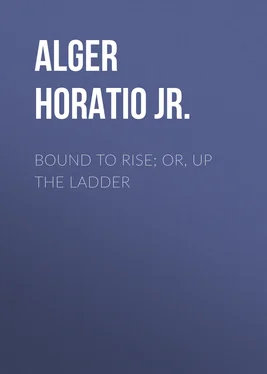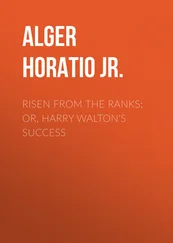Horatio Alger - Bound to Rise; Or, Up the Ladder
Здесь есть возможность читать онлайн «Horatio Alger - Bound to Rise; Or, Up the Ladder» — ознакомительный отрывок электронной книги совершенно бесплатно, а после прочтения отрывка купить полную версию. В некоторых случаях можно слушать аудио, скачать через торрент в формате fb2 и присутствует краткое содержание. Жанр: foreign_children, literature_19, foreign_antique, foreign_prose, на английском языке. Описание произведения, (предисловие) а так же отзывы посетителей доступны на портале библиотеки ЛибКат.
- Название:Bound to Rise; Or, Up the Ladder
- Автор:
- Жанр:
- Год:неизвестен
- ISBN:нет данных
- Рейтинг книги:5 / 5. Голосов: 1
-
Избранное:Добавить в избранное
- Отзывы:
-
Ваша оценка:
- 100
- 1
- 2
- 3
- 4
- 5
Bound to Rise; Or, Up the Ladder: краткое содержание, описание и аннотация
Предлагаем к чтению аннотацию, описание, краткое содержание или предисловие (зависит от того, что написал сам автор книги «Bound to Rise; Or, Up the Ladder»). Если вы не нашли необходимую информацию о книге — напишите в комментариях, мы постараемся отыскать её.
Bound to Rise; Or, Up the Ladder — читать онлайн ознакомительный отрывок
Ниже представлен текст книги, разбитый по страницам. Система сохранения места последней прочитанной страницы, позволяет с удобством читать онлайн бесплатно книгу «Bound to Rise; Or, Up the Ladder», без необходимости каждый раз заново искать на чём Вы остановились. Поставьте закладку, и сможете в любой момент перейти на страницу, на которой закончили чтение.
Интервал:
Закладка:
"We will now proceed to the regular lessons," said Mr. Burbank, in conclusion. "First class in arithmetic will take their places."
The first class ranked as the highest class, and in it was Harry Walton.
"What was your lesson to-day?" asked the teacher.
"Square root," answered Harry.
"I will give you out a very simple sum to begin with. Now, attention all! Find the square root of 625. Whoever gets the answer first may hold up his hand."
The first to hold up his hand was Ephraim Higgins.
"Have you got the answer?" asked Mr. Burbank in some surprise. "Yes, sir."
"State it."
"Forty-five."
"How did you get it?"
Ephraim scratched his head, and looked confused. The fact was, he was entirely ignorant of the method of extracting the square root, but had slyly looked at the slate of his neighbor, Harry Walton, and mistaken the 25 for 45, and hurriedly announced the answer, in the hope of obtaining credit for the same.
"How did you get it?" asked the teacher again.
Ephraim looked foolish.
"Bring me your slate."
Ephraim reluctantly left his place, and went up to Mr. Burbank.
"What have we here?" said the teacher. "Why, you have got down the 625, and nothing else, except 45. Where did you get that answer?"
"I guessed at it," answered Ephraim, hard pressed for an answer, and not liking to confess the truth—namely, that he had copied from Harry Walton.
"So I supposed. The next time you'd better guess a little nearer right, or else give up guessing altogether. Harry Walton, I see your hand up. What is your answer?"
"Twenty-five, sir."
"That is right."
Ephraim looked up suddenly. He now saw the explanation of his mistake.
"Will you explain how you did it? You may go to the blackboard, and perform the operation once more, explaining as you go along, for the benefit of Ephraim Higgins, and any others who guessed at the answer. Ephraim, I want you to give particular attention, so that you can do yourself more credit next time. Now Harry, proceed."
Our hero explained the sum in a plain, straightforward way, for he thoroughly understood it.
"Very well," said the schoolmaster, for this, rather than teacher, is the country name of the office. "Now, Ephraim, do you think you can explain it?"
"I don't know, sir," said Ephraim, dubiously.
"Suppose you try. You may take the same sum."
Ephraim advanced to the board with reluctance, for he was not ambitious, and had strong doubts about his competence for the task.
"Put down 625."
Ephraim did so.
"Now extract the square root. What do you do first?"
"Divide it into two figures each."
"Divide it into periods of two figures each, I suppose you mean. Well, what will be the first period?"
"Sixty-two," answered Ephraim.
"And what will be the second?"
"I don't see but one other figure."
"Nor I. You have made a mistake. Harry, show to point it off."
Harry Walton did so.
"Now what do you do next?"
"Divide the first figure by three."
"What do you do that for?"
Ephraim didn't know. It was only a guess of his, because he knew that the first figure of the answer was two, and this would result from dividing the first figure by three.
"To bring the answer," he replied.
"And I suppose you divide the next period by five, for the same reason, don't you?"
"Yes, sir."
"You may take your seat, sir. You are an ornament to the class, and you may become a great mathematician, if you live to the age of Methuselah. I rather think it will take about nine hundred years for you to reach that, point."
The boys laughed. They always relish a joke at the expense of a companion, especially when perpetrated by the teacher.
"Your method of extracting the square root is very original. You didn't find it in any arithmetic, did you?"
"No, sir."
"So I thought. You'd better take out a patent for it. The next boy may go to the board."
I have given a specimen of Mr. Burbank's method of conducting the school, but do not propose to enter into further details at present. It will doubtless recall to some of my readers experiences of their own, as the school I am describing is very similar to hundreds of country schools now in existence, and Mr. Burbank is the representative of a large class.
CHAPTER V. THE PRIZE WINNER
"Are you going to the examination to-day, mother?" asked Harry, at breakfast.
"I should like to go," said Mrs. Walton, "but I don't see how I can. To-day's my bakin' day, and somehow my work has got behindhand during the week."
"I think Harry'll get the prize," said Tom, a boy of ten, not heretofore mentioned. He also attended the school, but was not as promising as his oldest brother.
"What prize?" asked Mrs. Walton, looking up with interest.
"The master offered a prize, at the beginning of the term, to the scholar that was most faithful to his studies."
"What is the prize?"
"A book."
"Do you think you will get it, Harry?" asked his mother.
"I don't know," said Harry, modestly. "I think I have some chance of getting it."
"When will it be given?"
"Toward the close of the afternoon."
"Maybe I can get time to come in then; I'll try."
"I wish you would come, mother," said Harry earnestly. "Only don't be disappointed if I don't get it. I've been trying, but there are some other good scholars."
"You're the best, Harry," said Tom.
"I don't know about that. I shan't count my chickens before they are hatched. Only if I am to get the prize I should like to have mother there."
"I know you're a good scholar, and have improved your time," said Mrs. Walton. "I wish your father was rich enough to send you to college."
"I should like that very much," said Harry, his eyes sparkling at merely the suggestion.
"But it isn't much use hoping," continued his mother, with a sigh. "It doesn't seem clear whether we can get a decent living, much less send our boy to college. The cow is a great loss to us."
Just then Mr. Walton came in from the barn.
"How do you like the new cow, father?" asked Harry.
"She isn't equal to our old one. She doesn't give as much milk within two quarts, if this morning's milking is a fair sample."
"You paid enough for her," said Mrs. Walton.
"I paid too much for her," answered her husband, "but it was the best I could do. I had to buy on credit, and Squire Green knew I must pay his price, or go without."
"Forty-three dollars is a great deal of money to pay for a cow."
"Not for some cows. Some are worth more; but this one isn't."
"What do you think she is really worth?"
"Thirty-three dollars is the most I would give if I had the cash to pay."
"I think it's mean in Squire Green to take such advantage of you," said Harry.
"You mustn't say so, Harry, for it won't do for me to get the squire's ill will. I am owing him money. I've agreed to pay for the cow in six months."
"Can you do it?"
"I don't see how; but the money's on interest, and it maybe the squire'll let it stay. I forgot to say, though, that last evening when I went to get the cow he made me agree to forfeit ten dollars if I was not ready with the money and interest in six months. I am afraid he will insist on that if I can't keep my agreement."
"It will be better for you to pay, and have done with it."
"Of course. I shall try to do it, if I have to borrow the money. I suppose I shall have to do that."
Meantime Harry was busy thinking. "Wouldn't it be possible for me to earn money enough to pay for the cow in six months? I wish I could do it, and relieve father."
He began to think over all the possible ways of earning money, but there was nothing in particular to do in the town except to work for the farmers, and there was very little money to earn ill that way. Money is a scarce commodity with farmers everywhere. Most of their income is in the shape of farm produce, and used in the family. Only a small surplus is converted into money, and a dollar, therefore, seems more to them than to a mechanic, whose substantial income is perhaps less. This is the reason, probably, why farmers are generally loath to spend money. Harry knew that if he should hire out to a farmer for the six months the utmost he could expect would be a dollar a week, and it was not certain he could earn that. Besides, he would probably be worth as much to his father as anyone, and his labor in neither case provide money to pay for the cow. Obviously that would not answer. He must think of some other way, but at present none seemed open. He sensibly deferred thinking till after the examination.
Читать дальшеИнтервал:
Закладка:
Похожие книги на «Bound to Rise; Or, Up the Ladder»
Представляем Вашему вниманию похожие книги на «Bound to Rise; Or, Up the Ladder» списком для выбора. Мы отобрали схожую по названию и смыслу литературу в надежде предоставить читателям больше вариантов отыскать новые, интересные, ещё непрочитанные произведения.
Обсуждение, отзывы о книге «Bound to Rise; Or, Up the Ladder» и просто собственные мнения читателей. Оставьте ваши комментарии, напишите, что Вы думаете о произведении, его смысле или главных героях. Укажите что конкретно понравилось, а что нет, и почему Вы так считаете.












